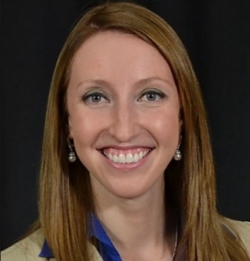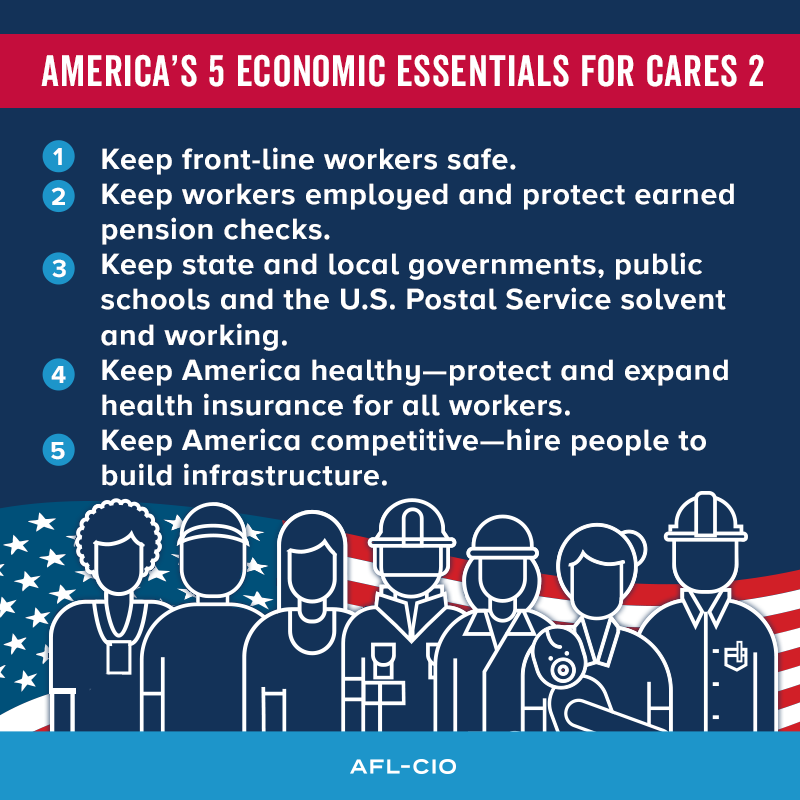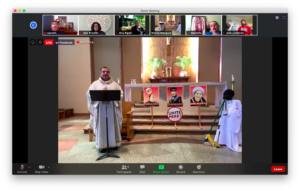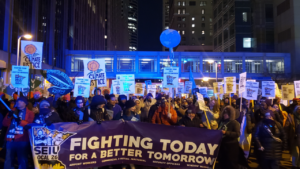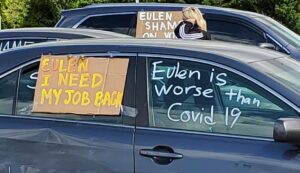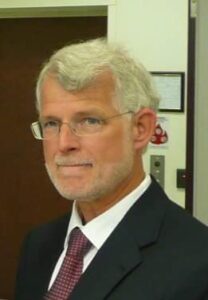On May 1, 2020 — the Feast of St Joseph the Worker — Fr. Sinclair Oubre presented A Personal & Brief History of the Founding of the Catholic Labor Network to a national audience via Zoom. In response to requests by listeners, here is the text of his address:
The personal roots of the Catholic Labor Network are found in my hometown of Port Arthur, Texas. This was a town where the word “union” was not a dirty word, and to be in a union was a source of pride. Though there had been many challenging strikes, the union families knew that though these had been hard time, the wages, pension, and healthcare benefits significantly outpaced those of their relatives in Louisiana.
Each union family knew that these wages and benefits were not gifts given by the refineries and construction companies, but were hard won union victories through collective bargaining, and sometimes by withholding each worker’s labor so as to demonstrate how serious the workers were.
In addition, Port Arthur and Southeast Texas had strong apprenticeship programs that trained the next generation of craftsmen. These apprenticeship programs supported a system where the individual craftsman’s welfare was directly tied to the welfare of his or her fellow union workers, and the welfare of their union.
In my own family, my great grandfather, my grandfather, my father, and my two uncles on my father’s side were all members of the Carpenter’s Union. Later, my father became a member of the Oil, Chemical, and Atomic Workers Union when he began working at the Texaco Refinery. In my high school graduating class, many of my classmates joined pipefitter, boilermaker, electrician, carpenter, or plumber apprentice programs. Others were hired directly into the plants as laborers, and eventually rose to be operators. All being members of the oil workers union. So, the roots of the Catholic Labor Network lie in my family’s union experience, and the tremendous benefits the union provided to my working class classmates in our parochial schools.
The personal roots of the Catholic Labor Network are also tied to a happenstance event that occurred at the University of St. Thomas’ Student Government Office. In 1978, while studying as a seminarian for the Diocese of Beaumont at St. Mary Seminary and the University of St. Thomas in Houston, Texas, I was elected to the University Student Government Association. Passing through the SGA office in what is today Crooker Center, I picked up a copy of a booklet entitled: “On the Condition of Labor” by Pope Leo XIII. I started thumbing through it, and I was astounded that at the end of the 19th century, a pope wrote a strong critique of Marxist socialism and free market capitalism, while offering a third way that promoted private property, subsidiarity, the common good, and the dignity of the human person. This was very different from the montages that we were making in religion class at my Catholic high school. If I was reading this instead of the pablum that was being served up, I would have paid more attention in class. This set me on a course of using every elective I had as an undergraduate to take political science courses that focused on Catholic Social Teaching and work.
In 1978, I became an honors philosophy student at The Catholic University of America. While there, I was blessed to be taken under the wing by Don Slaiman, a Jewish socialist who worked in the Organizing Department of the AFL-CIO. He worked hard to mentor young men and women who were interested in the labor movement. He introduced me to Frontlash, the AFL-CIO’s outreach program to college students. Soon after I joined Frontlash, Jessica Smith became the director, and she led the organization in many dynamic ways. She is still a close friend, and an assistant to the president of the American Federation of Teachers. Through Frontlash, I was able to make a number of lasting labor connections that led to other connections later in life.
Frontlash also made it possible for me to be a summer intern with the International Association of Machinists Union. During the summer, I worked in the political action committee office. IAM President William Winpisinger backed Ted Kennedy’s primary run against President Carter. This allowed me to be a go-fer at the Washington, D.C. Mayflower Hotel where all the pre-1980 Democratic Convention committee hearings were held.
All these experiences helped me to develop many strong local and national labor ties. Being ordained to the priesthood in 1986, I soon began a volunteer ministry to seafarers calling at our ports, and also I began to attend the Sabine Area Central Labor Council meetings. Through these meetings, I began to meet the business agents and officers from our different unions, and found them very welcoming. I also began to learn more about a Chicago priest named Msgr. George Higgins. For years, I had seen his column “The Yardstick” appear in our local diocesan newspaper. Articles about the grape and lettuce boycotts, the formation of the United Farm Workers, and many other labor issues were chronicled in Msgr. Higgins’ column in our bi-weekly diocesan newspaper.
I do not remember how, but I became aware that a number of theological faculties including Catholic University, the Dominican House of Studies and Oblate College were sponsors with the AFL-CIO in a conference entitled: A Dialogue Between The Religious and Labor Community on Social and Ethical Concerns in Changing Economy. At this January, 1989 program were Catholic leaders like Archbishop Weakland, Fr. William Byron, S.J., Fr. Ed Boyle, S.J., Sr. Nancy Sylvester, and Msgr. George Higgins.The conference addressed mutual labor and religion issues like: Human rights in the workplace, Living/just family wage, Plant closings, Organizing unions a moral right, and what can be done through Religion-Labor understanding and cooperation.
This conference was followed by a second conference in 1991, to observe the 100th Anniversary Rerum Novarum. In June of 1991, religious organizations and the AFL-CIO hosted in Atlanta: On the Condition of Workers in 1991: A Continuation of the Dialogue Between the Religious Community and Organized Labor. In the opening plenary session, Bishop John McCarthy, then bishop of Austin, Texas, wove a story of the how socio-economic conditions had frayed the ties between Catholic seminarians and unions.
In the 1920’s, an Irish boy’s father was in the union. In addition, all his uncles were union members. That boy fought in World War II, and because of the GI Bill was able to go to college, and thereby move into a white collar job. His son went to a better university, and became a lawyer or doctor. In addition, he became more affluent and had no contact with labor unions. This man then meets with his Pastor at the country club, who also has had no experience with unions either. Because the pastor’s grandfather had been a union member, but his father went to college on the GI Bill, and he had lived in the suburbs with his father working in an office. The affluent Catholic parishioner with is suburban well educated pastor had forgotten what labor did to put them where they were. Unions were just “Things that were important in the past, but were no longer necessary in the modern world.”
In 1993, Msgr. George Higgins with the assistance of William Bole published, Organized Labor and the Church: Reflections of a “Labor Priest.” This book gave me a great insight into Msgr. Higgins, and the elaborate and active relationship that had existed in the United States Catholic Church and the labor movement. In this book, I was introduced to the great Msgr. John A. Ryan, and Msgr. Reynold Hillenbrand, Fr. Raymond McGowan, and many other priests who dedicated a significant amount of their priestly ministry to promoting our Catholic Social teaching, especially as it related to worker and unions.
Reading Higgins’ reflections, I learned that there had been a strong relationship between the US bishops and labor, that there had been labor schools in hundreds of parishes, and parish priests were actively engaged in both helping to organize their workers into unions, while simultaneously working to stymie efforts by communist union members to take over the locals. This was such a different environment from what I had grown up in Port Arthur, where we could be having a knock-down-drag-out strike at Texaco that could last months, with about 20% of our parish men on the picket line, and 20% locked in the plant, and nary a word was spoken from the pulpit about the labor/management clash that was dividing our community.
Finally, by 1995, Decatur, Illinois had become the battleground for the future of industrial and manufacturing unions. In this one city, Staley had locked out its workers, and Bridgestone/Firestone and Caterpillar had forced its workforce out on strike because of demands for major contract concessions. In response, “Road Warriors” traveled throughout the country attending labor union and central labor council meetings.
One group came to Port Arthur, and showed a video and made a presentation at the Sabine Area Central Labor Council. In that video, a Decatur parish priest, Fr. Martin Mangan, was pepper sprayed during a sit-down strike at Staley’s main gate. Being the chaplain to the central labor council, and by now a member of the Seafarers International Union, and having a desire to see the old alliance between the US Catholic Church and America’s union movement reestablished, I decided that on my motorcycle ride home from my canon law studies at Catholic University that summer, I would stop off, and visit this priest, and find out how does one do “Labor Priest.”
I cold called Fr. Martin, and he welcomed me to stop by at the end of July. When we sat down at a local restaurant, I was all ready to ask Fr. Martin how to be a labor priest, but before the words got out of my mouth, he was asking me how to be a labor priest. It was apparent that if there ever had been a manual on how to be a labor priest, it had long since been lost.
Also in the early 1990’s, I met an ex-Franciscan brother, Steve Donahue at a Central Labor Council picnic. He was working for SEIU Local 100 out of New Orleans, and doing organizing work. I was so excited to meet someone trying to live the spirit of Dorothy Day and Peter Maurin, I struck up a friendship with him and his fellow Baton Rouge Catholic Worker, Tim Vining.
I also came to learn that there was a prison chaplain named Fr. Don Brooks in Tulsa, Oklahoma who was active with local unions. There was also Msgr. Charles Rice of Pittsburgh, Jack Egan of Chicago, Ed Boyle, S.J. of the Boston Catholic Labor Guild, Mary Priniski, and there was Deacon Bob Miller, who worked for the AFL-CIO as its United Way liaison. But there was no single, place where clergy, religious, Catholic Workers, or just Catholic union members could work together to continue the Catholic/Labor cooperation of the past. It is important to note that Msgr. Higgins had retired from the USCC, and though there continued to be an office of social justice, there was no one who specifically had the labor portfolio.
To both give spiritual support to the dispersed group of Catholic labor ministers, to promote Catholic Social Teaching relating to worker and unions, and to be a sign of solidarity with the striking and locked out workers in Decatur, I suggested to Fr. Martin that we hold a meeting in Decatur. Dates were set for March of 1996. Union families opened their doors to the attendees, and for three days, the 30 or so participants learned about the three Decatur labor struggles; they learned what each person was doing in their own corner of the country; and they received a lesson on the Labor Priest through a panel of people who lived it: John Cort, Msgr. George Higgins, Msgr. Charles Egan, and Fr. Ed Boyle, S.J.
The results of this first meeting were the establishment of a loose affiliation of Catholic clergy, religious and laity who promoted Catholic Social Teachings relating to work and unions, and the building and launching of a web page: catholiclabor.org.
In 2001, the Catholic Labor Network was invited to host a wrap-around seminar at the USCCB Catholic Social Ministry Gathering. I was attending a Interfaith Worker Justice Board Meeting with Tom Shellabarger on September 11, 2001. Tom invited me to attend a USCCB planning meeting for the 2002 CSMG. The committee approved CLN being part of the wrap-around sessions. From 2002 to the present, CLN has met on the Saturday of the CSMG. The program consisted of:
-
-
- Mass or morning prayer
- Discussion on the state of Church/Labor Questions
- Speakers
- Lunch with a keynote speaker
- And in more recent years, it is followed by the Administrative Board’s meeting
With the hard work of Clayton, first as a volunteer director, and later as a paid director, the Catholic Labor Network has grown to be the only Catholic association that is completely dedicated to promoting our CST regarding workers and unions, and to rebuild the classic Catholic/Labor coalition.
I have a concern about the ongoing support among the US bishops regarding their strong and clear support for the right of workers to organize in secular and church institutions as laid out in the 1986 pastoral Economic Justice for All. There have been some worrying trends:
Catholic Hospitals not supporting directive #7 in the Ethical and Religious Directives for Catholic Health Care Services; the erosion disappearance of diocesan building guidelines that considered collective bargaining as a value when bidding contracts; disturbing instances were dioceses have unilaterally dissolved their collective bargaining agreements with their unions.

